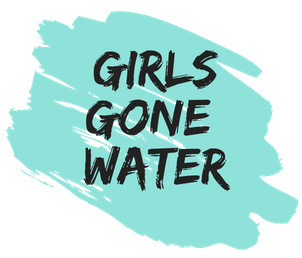The Water Trail
How asylum seekers access water on the move
At my catering job last night I mechanically filled 90 glasses with ice and then promptly poured in pitcher after pitcher of crisp, clean water until it neared each brim. About halfway through this process, the incredible inequity and simple unfairness of what I was doing hit me.
A section of the migrant caravan crosses the Suchiate River near the border between Mexico and Guatemala, via flickr.
A few weeks ago I started doing research for this article - an article about the unstable water access that people from Latin America are currently facing throughout their journey to seek asylum in the United States. As the water splashed into my 90 glasses, the image of the ~7,000-person caravan,* as it has come to be known, blurred my vision. The question of where these people get water during so many weeks of travel on foot, across multiple borders and varying terrains, had been plaguing me.
The border crossing between the U.S. (left) and Tijuana, Mexico (right), via Wikimedia. *The main caravan has made it to the Tijuana border crossing, where migrants await further legal action in order to enter the U.S.
The most reliable source of water for a person following this migrant trail up through Mexico is other people.
The route of the caravan is partially predetermined and partially decided on the move, largely depending on which towns will commit to hosting the caravan. The hosts range from municipalities themselves, to churches and non-profit groups. Along with a place to sleep (which may very well be outdoors) and some food, these volunteers also provide drinking water. This is no easy feat, as hundreds of people pour in at once with hundreds more trailing them, maybe a day behind. Earlier this fall, the Catholic Church of Chiapas, Mexico ran out of 1,320 gallons of prepared water as they to supply a wave of people with water for their journey to the next destination, likely dozens of miles away.
As I read these numbers - of people, of gallons of water, of miles walked from one point of refuge to the next - I have to stop to let the information sink in. We are talking about thousands of other people who have had to abandon their homes due to violence and extreme poverty. These are people who are crossing countries on foot, with their children, risking more violence and rejection when they finally do reach their destination.
Compounding all this is literal thirst and fear of where their next drink of water will come from.
The Washington Post reports that people were begging journalists for water - begging someone for the very same thing that guests at my catering event would soon be spilling as they danced. While this intense disparity exists, frivolity is not why these people are struggling for access to water. Organized crime and economic inequality stemming from past undemocratic military intervention and the privatization of water exclude certain people from basic human rights, and are far more culpable for the situation at hand.
“As I read these numbers - of people, of gallons of water, of miles walked from one point of refuge to the next - I have to stop to let the information sink in.”
Eventually the towns run thin and desert takes over. Here, the twisted game of where the next drink of water will come from becomes even more complicated. Once again it is community organizations that take it upon themselves to help ensure these people’s survival; organizations such as Border Angels (Ángeles de la Frontera), No More Deaths (No Más Muertes), and Human Rights Coalition (La Coalición de Derechos Humanos). These organizations travel the migrant routes placing individual jugs of water along trails as well as some larger water refill stations. They know migrants are using this precious resource because they track the water they put out, and hear directly from migrants that their services are saving lives. While this specific caravan of asylum seekers is not directly linked to the resources from these organizations, it is an important part of the migrant water trail.
The Humane Borders organization refills water stations in the desert along the Mexico-U.S. border, via Wikimedia.
The shocking counter culture to the humanitarian aid is a lack of empathy for these asylum seekers.
There have been protests against the caravan, dangerous rhetoric by U.S. President Trump along with his order to deploy military troops to the border, and reported intentional destruction of the water sources that are placed along migrant routes, carried out by U.S. border patrol agents.
As I poured out about half the water glasses at the end of last night, I reflected on the complex ways in which we redistribute water to certain areas and yet there are always areas lacking. Supplying drinking water to those in need should not fall on the shoulders of individuals or even individual towns. Water as a public good means the state should provide and protect the resource for all people.
Certainly, we must work to see the humanity in another person as they seek asylum and help supply them with water rather than inhibit their access.
If we look to the sixth sustainable development goal of the UN to “ensure access to water and sanitation for all” then we must make sure to include people who are in migration as well. This will require international collaboration on innovative infrastructure like community water stations and a greater emphasis on water as a human right, so that water is free and easily accessible for all people.
Tova Crystal
This article is by Tova Crystal. Tova is a recent college graduate who studied Political Science and Spanish with a personal focus on water governance. Tova is particularly interested in the equitable distribution of water and the environmental stewardship that is necessary to achieve this. Tova lives in Massachusetts and interns with Clean Water Action.




